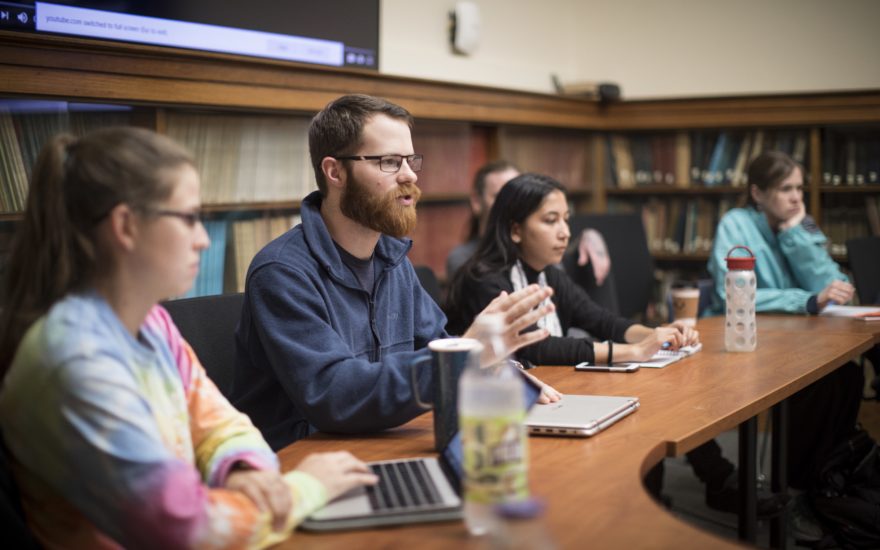Certificate in Monitoring and Evaluation

Design monitoring and evaluation systems for organizational learning and policy development.
The nature of development work — regionally, nationally or internationally — requires accountable, efficient programs that can measure the impacts of their interventions. Offered through Clark University’s Department of Sustainability and Social Justice (SSJ), the monitoring and evaluation certification ensures that current and aspiring community development and international development practitioners can take multiple perspectives, paradigms, and disciplines into account when developing, implementing, monitoring and evaluating major projects, development programs, and intervention strategies.
Unlike most evaluation programs, which focus on education or psychological assessment, we prepare you to work across a range of programmatic areas, including youth work, food and agriculture, refugee work, land tenure and natural resource management, education and gender.
Why a Certificate in Monitoring and Evaluation at Clark University
- Our monitoring and evaluation program is a unique combination of domestic and international issues.
- Network of work opportunities in small, midsize, and large cities.
- Earn a head start in your SSJ master’s degree program by applying 100% of your certificate course credits toward the full degree graduation requirements.
- Partnerships with national and international health, education, and human services organizations with access to experienced evaluation practitioners.
- Practice-based learning with collaborative research projects and professional internship opportunities.
The Essentials
Program Overview
The Certificate in Monitoring and Evaluation is open to early- and mid-career professionals. It is also open to current Clark University master’s degree and doctoral students who want to add professional training and certification to their graduate degrees.
We will prepare you for the analytically demanding roles of the field by exposing you to the practical application of program monitoring and evaluation. You’ll gain experience and perspective as an intern, by consulting with companies, or joining research/practice professional projects that connect directly with organizations and issues that you’re passionate about.
You can choose either a domestic or international track. Courses offer you the opportunity to:
- Understand the range of monitoring and evaluation methodologies and their implicit theories of action.
- Learn how to optimize methods and evaluation plans to match theories of change and development objectives.
- Gain a practical understanding of evaluation theory and practice across a range of small non-profits and large development agencies.
- Apply different methodological approaches to program evaluation.
- Negotiate with clients on a scope of work, design, and execution of plans.
- Program Evaluation for Youth and Community Development Initiatives (Domestic Track)
- Program Monitoring and Evaluation (International Track)
- Quantitative Methods and Statistics for Evaluators (online)
- Sustainable Development Assessment and Planning
- Community Needs Assessment and Resource Analysis
- GIS for International Development in Practice
This program offers a range of opportunities to apply what you learn with neighborhood groups, community organizations, companies involved in community development projects, non-governmental organizations (NGOs), and government agencies. Our students and faculty help develop monitoring and evaluation systems and assess development plans around the world, from Worcester to Nairobi. Students have worked with agencies, non-profits and NGOs in Bangladesh, Lebanon, Nepal, Laos, Uganda, Tanzania and Haiti.
Through hands-on fieldwork, you become an experienced, practical driver of social change. You can join faculty-led work on the forefront of international development and social change on projects such as:
- Evaluating land tenure, natural resource management, and climate change programs in Latin America and sub-Saharan Africa funded by the United States Agency for International Development.
- Reducing neighborhood violence with The Byrne Criminal Justice Innovation Program in the Main South Community Development Center of Worcester.
- Guide public health initiatives with Worcester Center for Public Health Practice, a health partnership between Clark, our Mosakowski Institute for Public Enterprise, and the City of Worcester.
- Advancing collaborative leadership on economic development in Massachusetts’ gateway cities with The Working Cities Challenge: Clark-Federal Reserve Bank of Boston Collaboration.
- Measuring the outcomes for men and women in the quickly evolving Ugandan banana-cultivating communities following the introduction of new banana cultivars.

